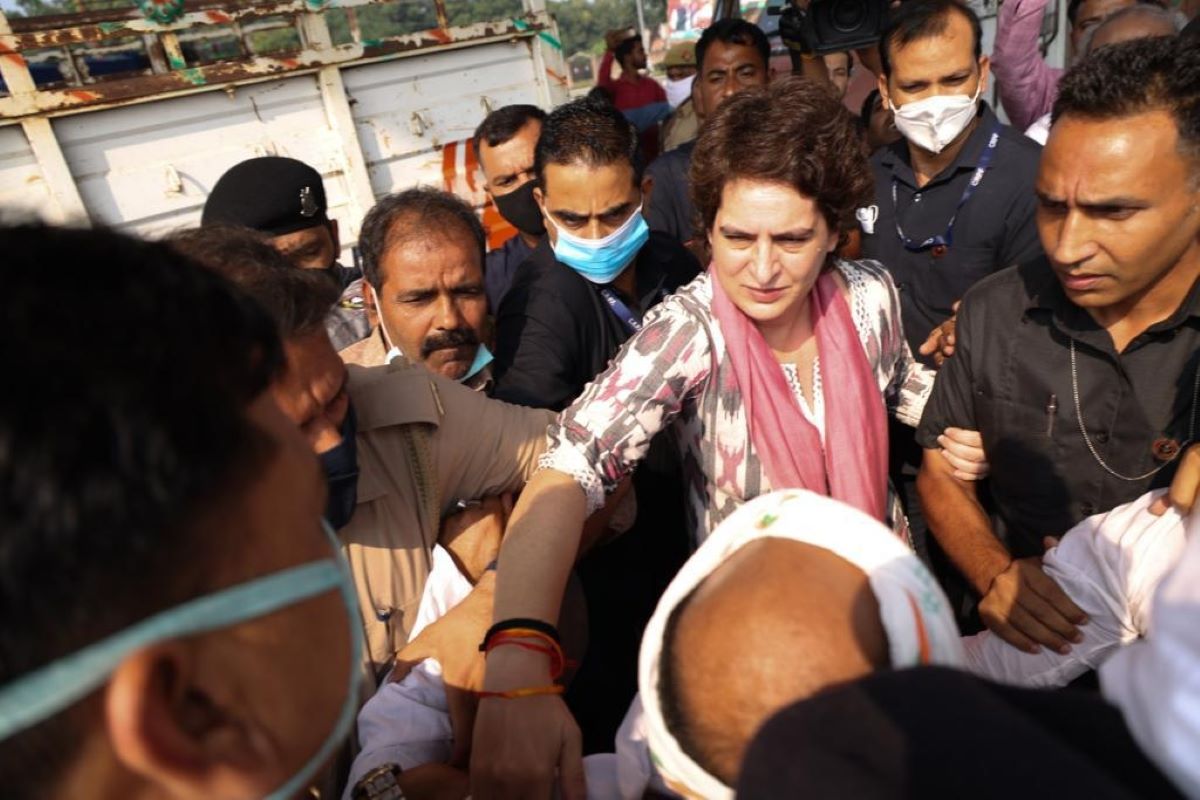Congress announces Vijayshanthi as a candidate for Telangana MLC elections
Congress seemed to have decided to honour its promises made during the Assembly polls and allot an MLC seat to CPI.
Indira Gandhi was the first woman prime minister in India, and there have been many chief ministers in the last five decades.

Priyanka Gandhi (IANS photo)
Will the Congress Party’s new gambit of using gender politics help the party win the state or improve its performance in Uttar Pradesh? Congress leader Priyanka Gandhi Vadra’s recent announcement that the party will give 40 per cent of its tickets to women in the upcoming UP elections is a welcome step if the message goes to the women who form almost half the electorate.
Having tried other tactics, the party strategists might have resorted to gender politics as a bold gambit. After all, the gender issue cuts across all castes and communities. Most political parties have been using caste and religion to get votes from the electorate.
Advertisement
The Rajya Sabha passed the Constitution (One Hundred and Eighth Amendment) Bill that sought to reserve one-third of all seats for women in Parliament and state legislatures. However, the Lok Sabha did not pass the bill. Most of the UP regional parties had opposed the quota bill or given halfhearted support when the bill came up in Parliament. Sucheta Kripalani was the first Congress chief minister in UP decades ago.
Advertisement
As per the 2019 Lok Sabha election data, Uttar Pradesh had 6.61 crore registered women voters as against 7.79 men, which makes women’s share in the electorate about 46 per cent. Uttar Pradesh has 403 assembly seats, and Congress has to find 160 women candidates in the next few weeks. In the 2017 UP Assembly polls, the number of women MLAs rose to forty compared to 36 in 2012.
Even in 2019, Congress fielded the maximum number of women at 54, followed by BJP at 53. Significantly, Uttar Pradesh and West Bengal sent the highest number of women parliamentarians. The quota announcement comes on the back of a reasonable strike rate shown by women candidates in the recent panchayat polls in the U.P. They won 54 per cent of village Gram Pradhan seats. Over the last few years, many political parties have promoted almost 50 per cent quota for women in local body elections but have not extended this to assembly or parliamentary polls.
It was late Congress Prime Minister Rajiv Gandhi who batted for 33 per cent reservation for women in panchayats, and P.V. Narasimha Rao got the Panchayat raj bill enacted. In recent times, Odisha chief minister Naveen Patnaik fielded women in 33 per cent of Lok Sabha seats, setting the bar high. The Trinamool Congress also fielded women candidates in 40 per cent of the seats in West Bengal.
Priyanka knows the difficulties in implementing the concept. “Is baar safal nahin honge, to agli baar honge (If they are not successful this time, then they will win next time,” she responded to a question about its success. The first hurdle is finding more than 100 winnable candidates in the next few weeks in a state which is chauvinistic and caste-oriented. So far, only social engineering and broad alliance have helped political parties.
Secondly, Congress plans to go solo in the polls, which may not be advantageous as the party has no organizational support while the other regional parties and the BJP have strong cadres. The Congress lost the support of its main base – Muslims and Dalits.
Thirdly women are not homogenous groups, and they do not always support other women in polls, as has been seen so far.
Fourthly, the other parties are now fielding dons and candidates with criminal backgrounds, as the statistics show. It will be tough for women candidates to fight unless they also have a political mentor or family background. It will be daunting for an ordinary woman to match muscle and money power. Slowly and steadily, women have to come forward as lawmakers. Holding political office is just the first step to wielding political power.
Indira Gandhi was the first woman prime minister in India, and there have been many chief ministers in the last five decades. Today women head five political parties – Congress, BSP, Trinamool Congress, Apna Dal, and PDP. The United States, with many progressive women in the political field, is yet to elect a woman president.
The 2020 American elections saw a woman reach the level of Vice President. In many countries, political systems still limit women’s ability to influence policy. Out of 193 countries, women hold 22.50 per cent cabinet positions in 13 countries, and only in three legislatures do they make up half the numbers.
In spite of all odds if the gambit works in U.P it will go a long way in women’s empowerment. As Priyanka claims it will at least make a beginning.
Advertisement